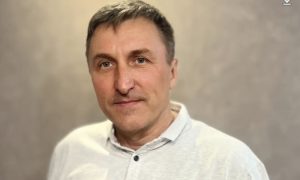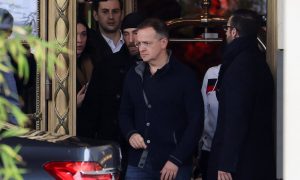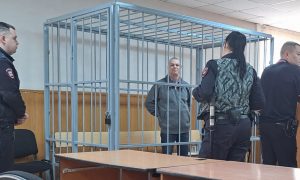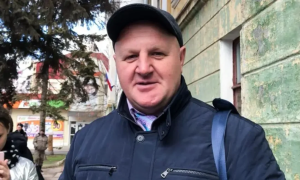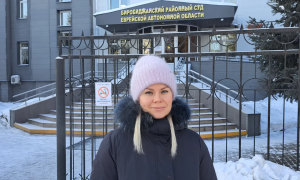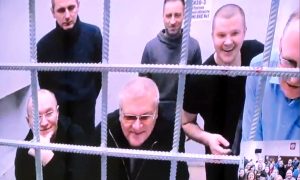“BY THE time this meeting is over, you will say, ‘This was truly a theocratic history-making annual meeting!’” With those words, Stephen Lett of the Governing Body of Jehovah’s Witnesses intensified the sense of keen anticipation in the large audience. They were gathered for the 126th annual meeting of the Watch Tower Bible and Tract Society of Pennsylvania, held on October 2, 2010, at the Assembly Hall of Jehovah’s Witnesses in Jersey City, New Jersey, U.S.A. What were some of the highlights of this historic occasion?
Brother Lett’s opening talk was an enthusiastic discussion of Jehovah’s celestial chariot as described in the Bible book of Ezekiel. This colossal, glorious vehicle pictures God’s organization, with Jehovah in complete control. Its heavenly part, composed of spirit creatures, moves with lightning speed—the speed of Jehovah’s own thoughts, Brother Lett said. The earthly part of Jehovah God’s organization is likewise on the move. Brother Lett noted a number of exciting developments in the visible part of God’s organization in recent years.
For instance, a number of branches are being merged and consolidated, which will allow many who were formerly serving in Bethel homes in those countries to focus on the preaching work. Brother Lett urged the audience to keep praying that the Governing Body, as the representative of the slave class, continue to be not only faithful but also wise, or discreet.—Matt. 24:45-47.
Encouraging Reports and Heartwarming Interviews
Tab Honsberger, who serves on the Branch Committee in Haiti, gave a touching report on the aftermath of the January 12, 2010, earthquake, which took an estimated 300,000 lives in that land. He noted that clergymen have been telling people that God punished those victims for being faithless while protecting the good. Yet, thousands of convicted criminals went free when the walls of a prison collapsed in the quake. Many honesthearted Haitians are thus finding comfort in learning the truth about why our times are so troubled. Brother Honsberger quoted a faithful Haitian brother who lost his wife in the disaster as saying: “I shed tears to this day. I don’t know how long I will continue to mourn, but I rejoice to feel the love of Jehovah’s organization. I have hope, and I am determined to share it.”
Mark Sanderson, now a member of the Brooklyn Bethel family, gave a report on the Philippines. A former member of the Branch Committee there, he fairly beamed as he spoke of the country’s 32 consecutive peaks in the number of Kingdom publishers and of the way the Bible studies far outnumber the publishers. He told of a brother named Miguel whose grandson was murdered. Miguel worked hard to have the murderer prosecuted and jailed. Later, when witnessing in the prison, Miguel met the murderer. Though nervous, Miguel addressed him mildly and kindly. He eventually studied with the man, who responded well and came to love Jehovah. He is now baptized. Miguel is his close friend and is working to win his new brother an early release from prison.*
The program next featured a get-acquainted interview conducted by Mark Noumair, an instructor in the Theocratic Schools Department. He interviewed three couples—Alex and Sarah Reinmueller, David and Krista Schafer, and Robert and Ketra Ciranko. Alex Reinmueller, a helper to the Publishing Committee, told of how he made the truth his own while pioneering in Canada when he was only 15 years old, often working by himself. Asked who had the most impact on him at Bethel, Brother Reinmueller mentioned three faithful men, pointing out how each of them had helped him to grow spiritually. His wife, Sarah, told of her friendship with a sister who endured decades in Chinese prisons for her faith. Sarah said that she has learned to rely on Jehovah through personal prayer.
David Schafer, a helper to the Teaching Committee, praised his mother for her strong faith and told of brothers who worked as loggers and helped him to auxiliary pioneer as a youth. His wife, Krista, spoke fondly of being influenced by older members of the Bethel family who proved to be “faithful in what is least,” as Jesus recommended.—Luke 16:10.
Robert Ciranko, a helper to the Writing Committee, reminisced about his four grandparents, who were Hungarian immigrants and anointed Christians. As a boy, he was impressed when he attended large conventions in the 1950’s and learned that Jehovah’s organization was far bigger than his own congregation. His wife, Ketra, told of how she learned about loyalty when servingas a pioneer in a congregation that was afflicted with apostasy and other problems. She endured and was eventually assigned to serve as a special pioneer in a congregation where the unity touched her heart.
Manfred Tonak next gave a report, on Ethiopia. This land dates back to Bible times, and it is now blessed with over 9,000 publishers of the good news. Most of them live in or near the capital, Addis Ababa. Remote areas thus need more attention. To address this need, Ethiopian Witnesses living in other countries were invited to visit in order to preach in some remote parts of the country. Many came, encouraged the local Witnesses, and found receptive listeners.
A program highlight was a symposium about Jehovah’s Witnesses in Russia and their legal struggles. Aulis Bergdahl of the Branch Committee in Russia presented a history of the persecution of the Witnesses in Russia, particularly in Moscow. Philip Brumley of the Legal Department at the United States branch told about the thrilling developments in recent months when the European Court of Human Rights (ECHR) heard the nine charges that had been leveled against the Witnesses. The Court unanimously found that none of the nine charges had any merit, in a number of cases even reasoning carefully to refute the arguments presented. While the results remain to be seen, Brother Brumley spoke hopefully of the impact that the Court’s ruling may have on cases in other lands.
Following this exciting news, Brother Lett announced that the ECHR had deemed as admissible the long-running tax case involving the government of France and Jehovah’s Witnesses. This highly respected Court admits very few of the cases presented to it. So far, the ECHR has considered a total of 39 cases involving Jehovah’s Witnesses, and it has ruled in our favor in 37 of them. Brother Lett encouraged all of God’s people to keep the current matter before Jehovah God in prayer.
The final report came from Richard Morlan, a field instructor of the School for Congregation Elders. He spoke enthusiastically about the school and the appreciative response from the elders who have attended.
Other Talks by Governing Body Members
Guy Pierce of the Governing Body gave a heartfelt talk that focused on the yeartext for 2011, “Take refuge in the name of Jehovah.” (Zeph. 3:12) He noted that while this is a happy time in many ways for Jehovah’s people, it is also a serious, sobering time. Jehovah’s great day is near; yet, people continue to seek refuge in false religion, political institutions, material wealth, escapism, and the like. To find a genuine refuge, we need to call upon Jehovah’s name, which involves knowing, deeply respecting, and trusting the Person represented by that name, loving him with everything we have.
David Splane of the Governing Body next delivered an earnest, thought-provoking discussion on the theme “Have You Entered Into God’s Rest?” He noted that God’s rest does not mean inactivity, since Jehovah and his Son have “kept working” throughout that figurative day of rest in order to bring God’s purpose for the things created regarding the earth to a successful conclusion. (John 5:17) How, then, may we enter into God’s rest? Desisting from sin and from works of self-justification are just part of the answer. We need to exercise faith and live with God’s purpose in mind, making whatever contribution we can to that purpose. At times, that may be a special challenge, but we need to accept the counsel and cooperate with the direction from Jehovah’s organization. Brother Splane entreated the audience to do everything possible to enter into God’s rest.
The final talk, delivered by Anthony Morris of the Governing Body, was entitled “What Are We Waiting For?” With urgency and fatherly warmth, Brother Morris reminded the audience of prophetic developments yet ahead of us, events that all faithful ones eagerly await. These include the cry of “Peace and security!” and the destruction of false religion. (1 Thess. 5:2, 3; Rev. 17:15-17) Brother Morris warned against saying, “This must be Armageddon,” in response to events in the news that do not fulfill such prophecies. He recommended the joyful, patient, waiting attitude described at Micah 7:7. At the same time, though, he urged all to “close ranks” with the Governing Body, to draw close together as would soldiers entering the thick of the battle. “May your heart be strong,” he said, “all you who are waiting for Jehovah.”—Ps. 31:24.
In conclusion, there were some thrilling, history-making announcements. Geoffrey Jackson of the Governing Body announced plans for the trial of a simplified study edition of The Watchtowerfor those with limited English-reading abilities. Then Stephen Lett announced that the Governing Body will arrange for shepherding visits to be provided for district overseers and their wives in the United States. He next revealed that the Ministerial Training School would henceforth be known as the Bible School for Single Brothers. It would soon be complemented by the Bible School for Christian Couples. This school would give couples further training so that they can be more useful to Jehovah’s organization. Brother Lett also announced that the School for Traveling Overseers and Their Wives and the School for Branch Committee Members and Their Wives would be expanded to two classes each year at Patterson, with provisions for those who have previously attended to attend a second time.
A touching conclusion to the program came when 97-year-old John E. Barr, longtime member of the Governing Body, offered a humble and sincere prayer.* Everyone left with the impression that this had indeed been a historic day.
